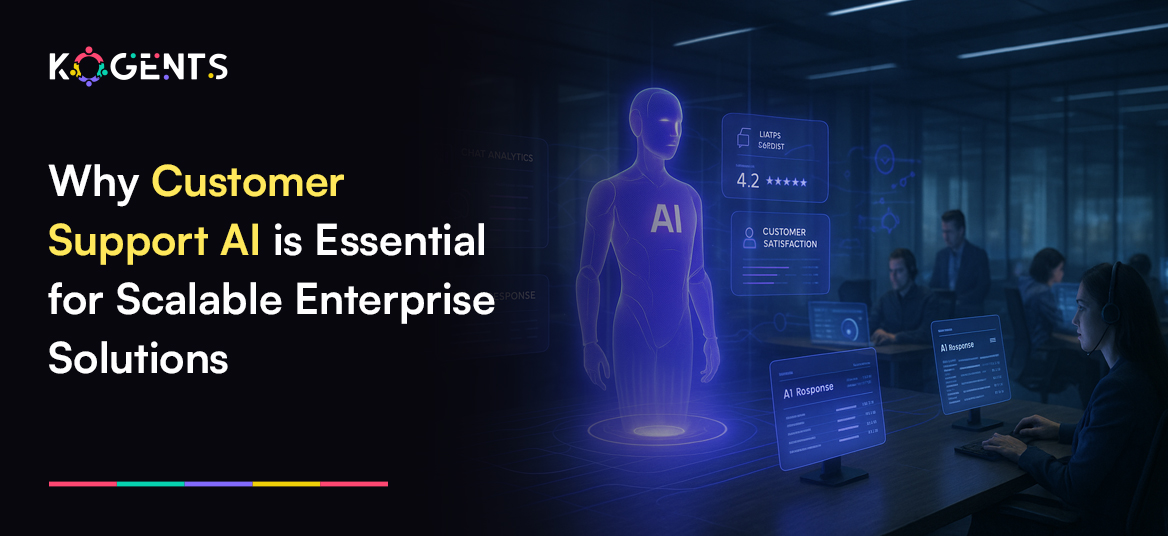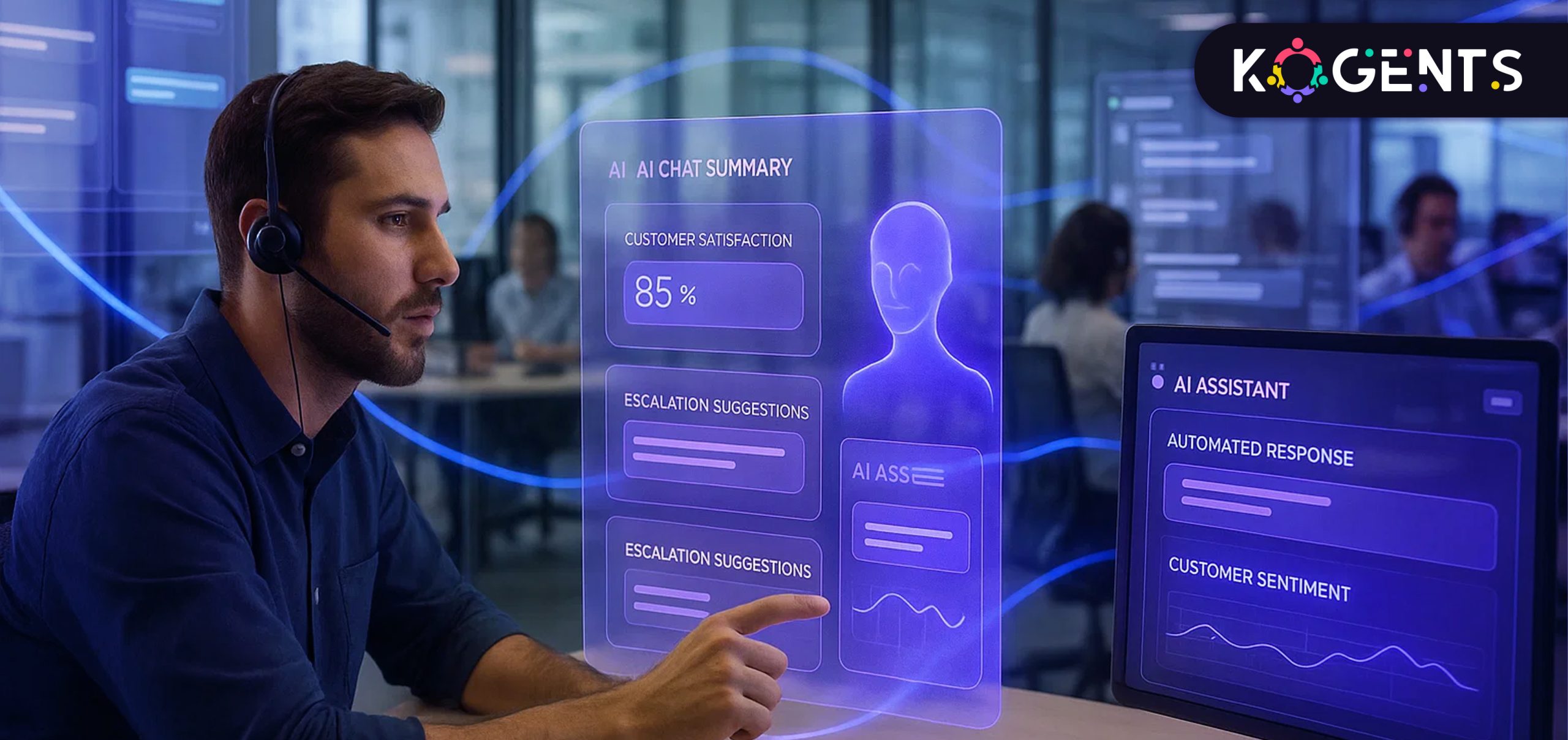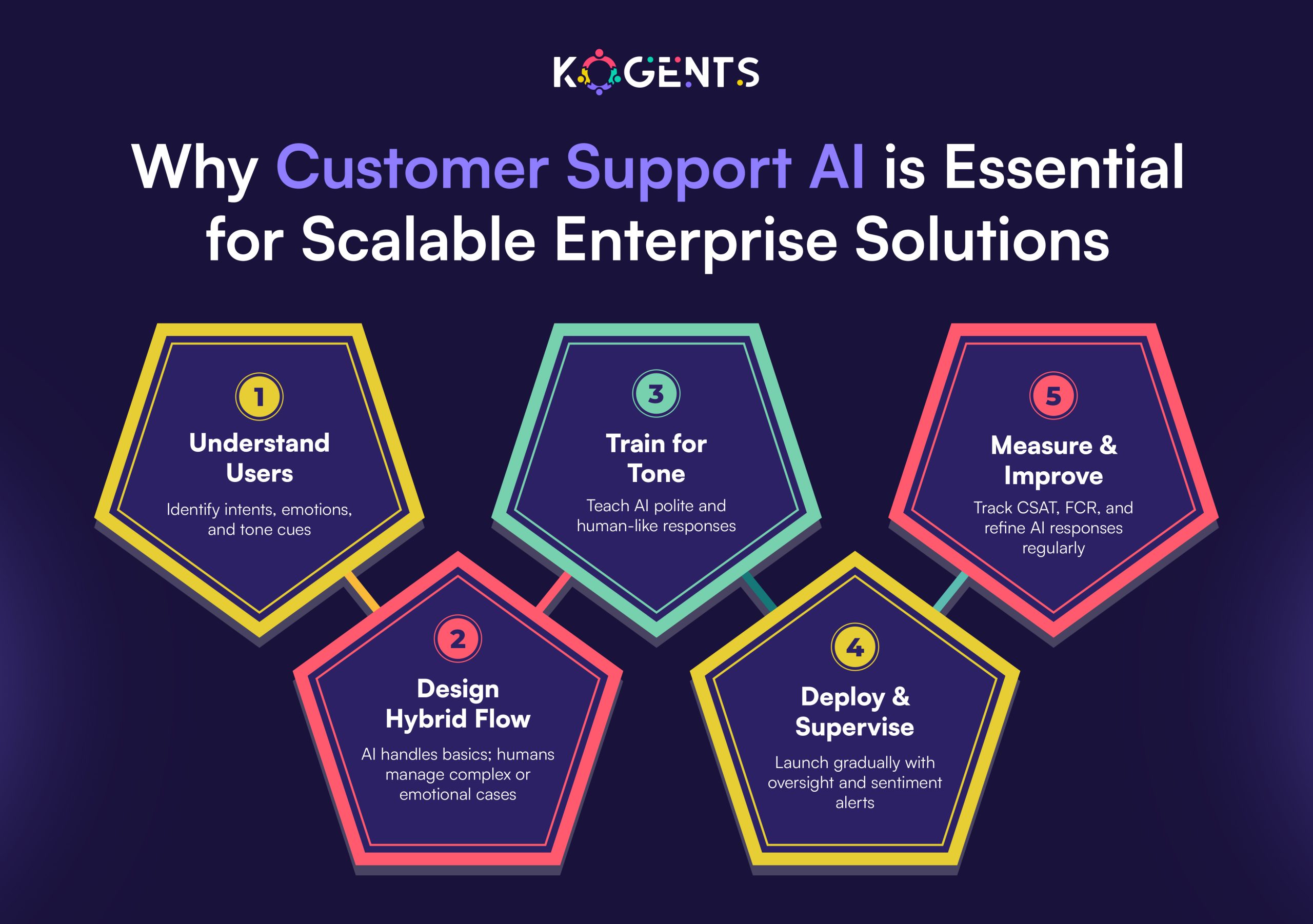Why Customer Support AI is Essential for Scalable Enterprise Solutions

Summary:
You must be fully aware of the fact that enterprises face mounting pressure to deliver seamless and high-quality service at scale.
But with the advent of boldface Customer Support AI, it is a game-changer, transforming how businesses operate.
This isn’t just about deploying a chatbot or automated FAQ system but about embedding a truly AI-powered customer support platform across channels, using conversational AI for customer support, virtual agent technology, and self-service AI support solutions.
For enterprise organisations aiming to scale without compromising customer experience, the question is no longer whether they should adopt AI for customer support but how quickly and how effectively they will.
Think of a scenario where your support team handles thousands of incoming queries across chat, email, and voice.
Traditional models buckle under volume, complexity, and expectation. But with automation, workflow automation, ticket routing guided by predictive analytics in support, and machine learning–driven triage, you get both speed and scale.
Metrics like first-call resolution (FCR), customer satisfaction (CSAT), and mean time to resolution (MTTR) start to shift in your favour.
Here’s how you will know!
Key Takeaways
- Enterprises cannot scale customer support effectively without leveraging AI-driven automation and intelligent virtual agents.
- Customer Support AI empowers both self-service and assisted-service models, enabling customers to help themselves and guiding agents when needed.
- Metrics such as FCR, MTTR, and CSAT directly benefit when AI is woven into the support workflow and ticket management ecosystem.
- Adoption must include human-AI collaboration (not AI vs human) and robust governance frameworks to ensure trust, accuracy, and compliance.
- Selecting the right platform (AI customer service automation, AI-powered customer support platform) and implementing it well is the differentiator between success and costly failure.

Why Customer Support AI Matters for Scalable Enterprise Solutions?
Addressing Volume & Complexity at Scale
Large enterprises handle huge volumes of inbound queries across voice, chat, email, social, etc.
Traditional models choke under peak load, long wait times, fragmentation, and high cost per contact. With AI for customer support, an intelligent layer can:
- Use natural-language processing (NLP) and machine-learning support to classify intent, triage issues, route tickets, and escalate appropriately.
- Empower self-service portals and chatbot/virtual agent solutions to absorb routine requests, deflecting a significant portion of tickets.
- Provide knowledge-base AI that surfaces correct answers to agents or customers instantly, reducing resolution time.
Delivering Consistent 24/7, Omnichannel Support
Customers expect support any time, any channel, seamlessly. Enterprises must provide omnichannel support, meaning the same experience whether via chat, voice bot, email, or social DM.
AI-driven customer support enables:
- Automated 24/7 live chatbots and voice bots that handle initial interactions, so human agents aren’t bound by business hours.
- Ticket routing and workflow automation that ensures no query falls through the cracks.
- Enhanced customer experience, contributing to higher CSAT and reduced MTTR.
Enhancing Efficiency, Reducing Costs
Enterprise scale means cost management is critical. Customer service AI helps drive efficiency by:
- Deflecting routine queries thereby reducing manual workload.
| Example: A case study noted a 43% ticket deflection rate using support AI. |
- Decreasing average handling times, reducing agent onboarding/training overhead thanks to AI-assisted agents.
- Improving first-call resolution (FCR) via accurate knowledge retrieval and predictive routing.
- Ultimately delivering a return on investment (ROI) via cost savings + improved customer retention.
Improving Customer Experience & Loyalty
Scalable support doesn’t mean sacrificing personalisation, quite the opposite. AI enables personalisation at scale:
- Sentiment analysis and real-time feedback to prioritise unhappy customers or escalate proactively.
- AI can remember prior interactions (via conversational memory) and surface context, so the customer doesn’t repeat themselves.
- The combination of AI + human support enables “humans for empathy, machines for efficiency”.
Key Note: Through better experiences, enterprises can improve their Net Promoter Score (NPS) and reduce churn.
Enabling Data-Driven Insights & Continuous Improvement
Customer Support AI isn’t just a tool for cost reduction; it becomes a strategic asset. With the right platform:
- You capture rich data: agent performance, customer sentiment, path-to-resolution, and FAQ gaps.
- Use predictive analytics to support identifying emerging issues, optimise staffing, and allocate resources dynamically.
- Use generative AI and agent assist tools to continuously improve the knowledge base, reducing MTTR over time.
How to Implement Customer Support AI in an Enterprise Setting?
Implementation Roadmap:
- Define Use-Cases: Start with high-volume, low-complexity interactions (e.g., FAQs, password resets), then scale to more complex workflows using AI.
- Select platform: Choose an “AI-powered customer support platform” that supports conversational AI, integrates with ticketing systems, CRMs, and knowledge bases, and allows for virtual agent deployment.
- Data & Integration: Ensure your CRM, support ticketing system, knowledge base, and customer interaction history are well integrated. Knowledge base AI depends on high-quality data.
- Human-in-Loop Governance: While customer experience automation can handle routine tasks, human agents should oversee complex queries, ethical compliance, and continuous improvement. Establish clear escalation paths.
- Metrics & KPIs: Track key support metrics like CSAT, FCR, MTTR, cost per contact, ticket deflection rate, and automation rate.
- Continuous Learning & Feedback: Incorporate feedback loops where AI improves (via ML, RAG frameworks) and agents contribute knowledge back.
| A recent study highlighted an “Agent-in-the-Loop” framework that improved precision and recall in support systems. |
- Governance & Compliance: AI in support must respect data privacy (GDPR, etc), ensure transparency, eliminate bias, and maintain human oversight.
Want to Scale & Optimise? Deploy across channels, geographies, and languages, and then optimise workflows, expand the knowledge base, and refine ticket routing based on AI-driven insights.
Key Metrics Before vs After Customer Support AI Implementation
| Metric | Pre-AI Implementation | Post-AI Implementation (Target) |
| Self-service / Ticket Deflection Rate | ~10–20% | 40–50%+ |
| Average Handling Time (AHT) | e.g., 12 mins | e.g., 7–8 mins |
| First Call Resolution (FCR) | 65–70% | 80%+ |
| Customer Satisfaction (CSAT) | 78% | 85%+ |
| Cost per Contact | High | 20–30% reduction |
Relevant Case Studies
Here are credible, non-repetitive case studies aligned with Customer Support AI in enterprise contexts:
Best Buy (with Accenture & Google):
- Best Buy implemented generative AI in its support function, virtual assistants for customers, AI tools for employees, and integrated generative AI in customer service workflows.
- They aimed to make interactions more convenient, personalised, and scalable.
Result Insights: The self-service customer service virtual assistant handles order changes, software subscriptions, and customer queries; agents use AI suggestions, real-time guidance, and sentiment detection.
Vodafone – SME / enterprise hybrid:
- It faced fragmented data across multiple customer-service systems, which caused long wait times.
- They used a chatbot built on IBM Watson Assistant to unify search across contract, pricing, and support.
Results: Improved agent access to data, faster resolution, and higher support-centre efficiency.
- While smaller than a multinational enterprise, this example demonstrates the impact of customer service AI:
- Ticket deflection by 43%, a 50% reduction in ticket volume through self-service, and CSAT up by 9.4%
Lessons: Even brands with limited resources can deploy chatbots + sentiment analytics to move the needle.
- It incorporated Microsoft Azure OpenAI Service to build “Ask Telstra,”.
- This summarised customer history and provided answers to agents in seconds via NLP retrieval.
Impact: Agents spend less time context-switching, resolution times improve, and customer experience is boosted.
Challenges & How to Overcome Them
While the upside is compelling, enterprise adoption of Customer Support AI has pitfalls:
- Data quality & silos: If knowledge base and interaction data are fragmented, AI performance suffers. Overcome by centralising systems and cleaning data.
- Governance, ethics & bias: Poorly implemented AI can lead to wrong advice, customer frustration, or regulatory issues. Rigorous oversight, transparency, and human-in-loop feedback are required.
- ROI delays & hype: Not every AI project delivers immediate value.
A recent report from Gartner warns that over 40% of “agentic AI” projects will be scrapped by 2027.
- Customer trust & “AI vs human” anxiety: Customers still value human interaction. The hybrid model (AI + human) is essential.
Why Over-automation Is A Risk? Automating too much without human fallback may degrade experience (e.g., chatbot “doom loops” in finance).

Know How AI is Redefining the Future of Customer Support?
Agentic AI: Autonomous best AI agents for customer support are capable of decision-making and taking action with minimal human input
Example: the Cisco report predicts 68% of interactions will be handled by agentic AI by 2028.
Generative AI + LLMs: Use of large language models for summarisation, response generation, agent assist, and knowledge generation.
Emotion-aware AI / Sentiment analysis: AI is able to detect customer mood and adjust the support path accordingly.
Hyper-personalisation at scale: AI using large data sets to tailor support interactions to individual customer profiles, context, and history.
Proactive support / Predictive analytics: Instead of waiting for a query, AI anticipates issues and alerts customers or resolves problems pre-emptively.
Multimodal support: Voice, video, text, image, integrated by AI systems to provide a unified experience.
Human-AI collaboration Models: More focus on “agents + AI assistants” rather than replacement, with humans focusing on strategic, empathetic tasks.
Integration of self-service + agent assist: Blending strong self-service portals (driven by AI) and agent tools for complex scenarios.
Deploy Customer Support AI with Kogents!
In conclusion, deploying Customer Support AI is not a nice-to-have; it’s essential for any enterprise that wants to scale support operations with precision, consistency, and cost-efficiency.
By leveraging AI customer service automation, customer support virtual agent AI, and self-service AI support solutions, enterprises unlock better customer experiences, stronger operational efficiency, and a strategic advantage.
At Kogents.ai, we specialise in empowering entrepreneurs, solopreneurs, and enterprise healthcare providers with AI-driven support platforms that combine powerful AI, seamless integration, and human-in-loop design.
So, contact us at (267) 248-9454 or email us at info@kogents.ai
FAQs
What is Customer Support AI, and how does it work?
Customer Support AI is the use of artificial intelligence technologies like chatbots, virtual agents, conversational AI for customer support, and self-service AI support solutions to automate and improve customer service operations. It works by using natural-language processing (NLP), machine-learning support, ticket routing, and knowledge base AI to understand customer intent, provide automated responses, escalate issues when needed, and optimize the support workflow.
How is AI transforming customer service operations in large enterprises?
Enterprises use AI to streamline high-volume interactions, implement self-service portals, route tickets intelligently, assist support agents in real time, personalise interactions, reduce backlog, and escalate the right issues more quickly.
What metrics improve when using customer support AI?
Key metrics include Customer Satisfaction (CSAT), First Call Resolution (FCR), Mean Time to Resolution (MTTR), automation/deflection rate, cost per contact, and agent productivity.
What are the challenges of deploying customer support AI, and how can they be mitigated?
Challenges include data silos, poor knowledge bases, customer resistance, over-automation, governance & ethics, and unrealistic ROI. Mitigations: clean data, pilot programs, hybrid human-AI model, clear escalation, training, governance frameworks, incremental deployment.
How can small to medium enterprises (SMEs) or solopreneurs benefit from Customer Support AI?
While enterprise scale leads to big numbers, SMEs/solopreneurs can also benefit. Self-service portals and AI-chatbots allow them to deliver “enterprise-level” support without large support teams, enabling 24/7 availability and freeing founders/owners to focus on growth. Starting small, then scaling, is key.
What does the future hold for Customer Support AI?
The future includes more widespread adoption of agentic AI (autonomous AI agents capable of decision-making), deeper generative AI integration, emotion/sentiment-aware support, proactive problem resolution, multimodal support (voice, video, chat), and tighter human-AI collaboration. Organisations that adopt early and well will gain a competitive edge.
FAQs
Customer Support AI is the use of artificial intelligence technologies like chatbots, virtual agents, conversational AI for customer support, and self-service AI support solutions to automate and improve customer service operations. It works by using natural-language processing (NLP), machine-learning support, ticket routing, and knowledge base AI to understand customer intent, provide automated responses, escalate issues when needed, and optimize the support workflow.
Enterprises use AI to streamline high-volume interactions, implement self-service portals, route tickets intelligently, assist support agents in real time, personalise interactions, reduce backlog, and escalate the right issues more quickly.
Key metrics include Customer Satisfaction (CSAT), First Call Resolution (FCR), Mean Time to Resolution (MTTR), automation/deflection rate, cost per contact, and agent productivity.
Challenges include data silos, poor knowledge bases, customer resistance, over-automation, governance & ethics, and unrealistic ROI. Mitigations: clean data, pilot programs, hybrid human-AI model, clear escalation, training, governance frameworks, incremental deployment.
While enterprise scale leads to big numbers, SMEs/solopreneurs can also benefit. Self-service portals and AI-chatbots allow them to deliver “enterprise-level” support without large support teams, enabling 24/7 availability and freeing founders/owners to focus on growth. Starting small, then scaling, is key.
The future includes more widespread adoption of agentic AI (autonomous AI agents capable of decision-making), deeper generative AI integration, emotion/sentiment-aware support, proactive problem resolution, multimodal support (voice, video, chat), and tighter human-AI collaboration. Organisations that adopt early and well will gain a competitive edge.

Kogents AI builds intelligent agents for healthcare, education, and enterprises, delivering secure, scalable solutions that streamline workflows and boost efficiency.